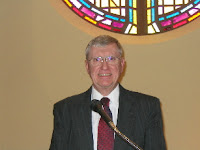“Until
our consciences are bound by Scripture so that our actions are the product of
conviction, we will be the victims of fluctuating fancies and susceptible to
the “security” that is offered in conformity to a long list of human taboos.
Convinced, grace-filled, spirit-led obedience to God’s Law really is the
pathway to freedom. Remember, the law is not the dynamic of our sanctification,
God’s love for us is not on the basis of duty, but neither does His love for us
free us from duty.”
~ Alistair Begg, Pathway to Freedom
Sunday, March 17, 2013
Sunday, March 10, 2013
For the Lord's Day
“Love
without righteousness is immorality, though today in some religious circles is
it called the “new morality.” Righteousness without doctrine is legalism. This
is the kind of religion that existed in Christ’s day in Judaism and against
which he was so outspoken. Doctrine without love is a bitter orthodoxy. It is
the kind of truth that is rigorously perfect, in a sense, but which does not
win anyone. All three of these elements [Love, Righteousness, and Doctrine]
must be present in the life of any true and growing Christian.” –
James Montgomery
Boice, in the Preface to The Epistles of
John
Sunday, March 3, 2013
For the Lord's Day - Communion Sunday
“The
Lord’s Supper is not for all indiscriminately as the gospel is. The Lord’s
Supper is chiefly commemoration and communion. It is for those who discern the
Lord’s body, who can commemorate his death in faith and love. And since the
supper is also Communion it is obviously for those who commune with Christ and
with one another in the unity of the body which is the church…. It is part of
the whole counsel of God that those conditions be clearly and insistently set
forth, to the end that those who are eligible partake and those who are not
refrain.” -- John Murray, Collected Writings
Sunday, February 24, 2013
For the Lord's Day
“I am not worthy, Master and Lord, that you should come beneath the roof
of my soul: yet, since you in your love toward all wish to dwell in me, in
boldness I come. You command, ‘Open the gates’ – which you alone have forged;
and you will come in with love toward all as is your nature; you will come in
and enlighten my darkened reason. I believe that you will do this: for you did
not send away the harlot that came to you with tears; nor cast out the
repentant publican; nor reject the thief who acknowledged your kingdom; nor
forsake the repentant persecutor, a yet greater act; but all of those who came
to you in repentance, were counted in the band of your friends, who alone abide
blessed forever, now and unto endless ages.”
– John Chrysostom (c.
347-407)
Sunday, February 17, 2013
For the Lord's Day
“Our need to be in charge of
ourselves, others and situations often makes our relationship with Christ
life’s biggest power struggle. We are reluctant to relinquish our control and
allow him to run our lives. We may believe in him and be active in the church
and Christian causes, but trusting him as Lord of everything in life can be
scary. Even though we pray about our challenges and problems, all too often
what we really want is strength to accomplish what we’ve already decided is
best for ourselves and others. Meanwhile, we press on with our own priorities
and plans. We remain the scriptwriter, casting director, choreographer, and
producer of the drama of our own lives, in which we are the star performer.” - -Twelve
Steps to Living Without Fear, Lloyd John Ogilvie
Sunday, February 3, 2013
For the Lord's Day
God
Substituting Himself for Man
The concept of substitution may be said to lie at the
heart of both sin and salvation. For the essence of sin is man substituting
himself for God, while the essence of salvation is God substituting Himself for
man. Man asserts himself against God and puts himself where only God deserves
to be; God sacrifices Himself for man and puts Himself where only man deserves
to be. Man claims prerogatives which belong to God alone; God accepts penalties
which belong to man alone. John
Stott in The Cross of Christ
Subscribe to:
Posts (Atom)



